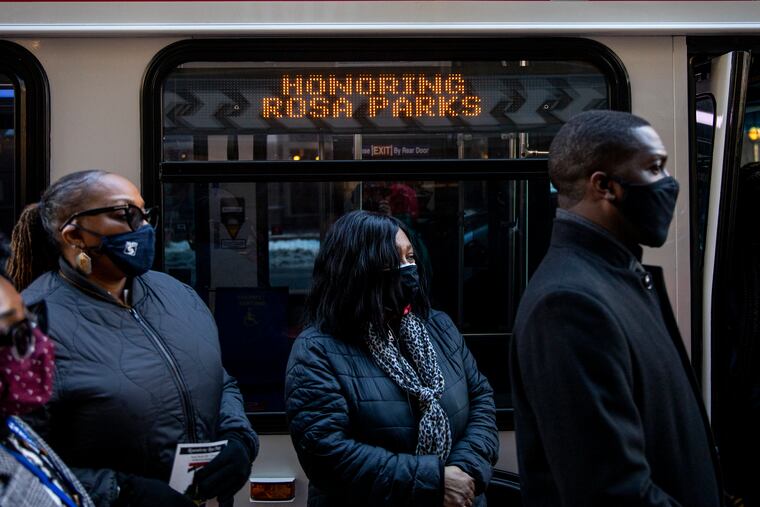Letters to the Editor | Dec. 1, 2022
Inquirer readers on Rosa Parks, access to reproductive health care, and high school math.

A historic action
Dec. 1, 1955, should be remembered on par with April 19, 1775, the day that the first shots were fired against the British at Lexington and Concord. On that chilly December day, Rosa Parks refused to move her bus seat. Within a few days, the Montgomery bus boycott was launched. This wasn’t the first time nonviolent direct action was used or was triumphant. However, the enormous success of the boycott — and the U.S. Supreme Court decision that segregation on public buses was unconstitutional — sparked the sit-in movement, Freedom Rides, and other nonviolent protest marches and boycotts across the South. It culminated in the 1964 Civil Rights Act and the 1965 Voting Rights Act. Thank you, Mrs. Parks, for sitting down for your rights.
Paul L. Newman, Merion Station
Preserving access
The recent election proved that local and state politics matter — and Philadelphia is taking that to heart. Despite state House election results, Philadelphia City Council recognizes ongoing state-level threats to abortion such as SB 106, which aims to ban abortion access in Pennsylvania. On Dec. 1, City Council is scheduled to vote on the Reproductive Freedom Platform to protect access to reproductive care at the local level. This platform recognizes the connection between access to reproductive health care and overall health and well-being for people, families, and communities. We urge Council to take action to protect the rights of Philadelphians and those who seek abortion care here. Protecting access to abortion and reproductive health care also must be a priority for the new legislature. Everyone deserves the opportunity to make reproductive health decisions that are right for them.
Melissa Weiler Gerber, president and CEO, AccessMatters, Philadelphia, info@accessmatters.org
Elective math
Jemille Q. Duncan’s op-ed on the dereliction of the current high school curriculum is on target. His observation concludes that schools pushing students to spend so much time studying higher and higher levels of math is the most common reason for students to drop out of high school. A more realistic approach could be exposing most, if not all, students to more practical forms of mathematical study, such as the basics of personal financial management, home economics, and investments, as well as comfort in estimating probability and risk when calculating interest rates. Another practical option is requiring schools to have nonquantitative courses, such as civics, about how our government functions and the importance of voting, basic U.S. and world history courses, learning another language, social studies, and even philosophy. Higher math studies should still be available as an elective option for students who are truly interested. Only with exposure to a broader spectrum of options for basic high school education will students be able to have the practical skills that allow them to plan and sustain successful adult lives, whether or not they decide to seek higher education.
Paul L. Schraeder, Philadelphia
Join the conversation: Send letters to letters@inquirer.com. Limit length to 150 words and include home address and day and evening phone number. Letters run in The Inquirer six days a week on the editorial pages and online.